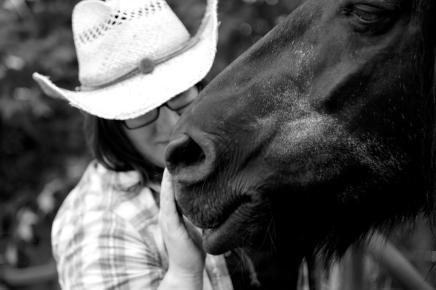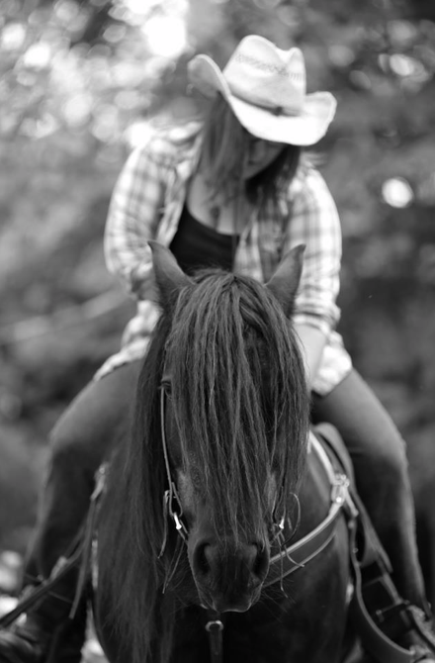As modern folks, many of us have that one website that we click to habitually for updates. Maybe you’re addicted to friends Facebook status updates, or a message board of some sort. I’ve got a website of my own that I’m hooked on. It’s the blog of author and young farmer Jenna Woginrich. Her homestead, Cold Antler Farm boasts a small flock of Black-faced Scottish sheep, two draft ponies, a menagerie of poultry and rabbits, working dogs and two dairy goats. She’s been documenting her journey as a beginning farmer for years now, hosting events at her Washington County paradise year-round. She’s got an impressive list of DIY books to her name. Jenna’s been a huge inspiration to me, she’s a force to be reckoned with.
Jenna’s writing stands apart from many of the other homesteading blogs out there, which is why I love it so much. Her depiction is a romantic portrayal of farm life, sure, but she articulates her day to day life in a way that lacks the fluff and polish that some other blogs fall victim to. It is more robustly appreciative, even through the hardships she inevitably faces as the solitary steward of her farm. The boils and scars are all there for us to see. It’s fascinating and there is much to learn from her experiences. So check out her blog, read on below. I’m certain you’ll be clicking to check in on her as much as I do.
I’ve always been very impressed with your ability to juggle the daily maintenance of your farm, a full-time job (up until recently, when you took the courageous leap into self-employment) and manage to be a very prolific writer. Do you have any advice out there to the folks who struggle to find the time to follow their passion and also keep their everyday life in check? Possibly even some organizational tips?
I think my own secret to success is 100% unadultarated stubbornness. I made up my mind I wanted a certain type of life and went for it, blinders on. My advice is simple: prioritize what matters most to you as far as goals go and make sure every single day you are doing something to work towards that. If you want to be a farmer, for example, plant a seed today. Maybe in a few weeks you’ll have a started plant you could sell to a coworker? See, that there is farming. It is possible in the middle of an apartment or on 500 acres. The proximity to land has nothing to do with it, your drive does.
As a writer, what do you think was the most difficult obstacle overcome? Correct me if I’m wrong, but you didn’t go to school for writing, you just took to it naturally. When did you begin to feel like you were coming into your own as a writer? Was there one moment in particular that it dawned on you that you were, in fact, a writer and not simply an author?
I never took any sort of real writing classes, just the basic English and Composition style classes my high school and college offered. I went to school for graphic design, and always considered myself more of an artist than a writer. But as I moved around the country I found that writing was what centered and grounded me, it kept me in contact with family and friends, journaled my adventures, and made my life feel more one of myth. I wrote because I couldn’t help it, and I think that’s what really makes you a writer: not degrees and classes.
There’s a certain contingent that sees the sort of lifestyle that you or I lead as sort of precious, overly romanticized and kind of unrealistic for the average person. What do you say to that?
I say they are right. My life is overly romanticized, extremely precious, and totally unrealistic. Which is exactly why I live it! You get one chance at this world and if you bought the chump story reality and peer approval are the same thing, you’re in for a long, boring ride.
Can you describe to me your first experience raising an animal for slaughter? How did you choose what sort of livestock to raise for consumption? What was your first preparation of the meat?
My first animal I raised to eat was a Thanksgiving Turkey, America’s favorite animal sacrifice! But I was a vegetarian at the time, well, a vegetarian on the edge. I didn’t eat meat because I didn’t want to support factory farms, but when I moved to Vermont I realized I could raise some of my own and wanted to start with that turkey. From day one it was food, not a pet and I named him TD. I never got attached or had a personal struggle with it. I am a firm believer in evolution and ecology’s plan for us omnivores. I watched him die at a local outdoor poultry operation, get de-feathered and gutted and took him home in a plastic bag. He was 28 pounds dressed!!!! I felt nothing but pride and gratitude. I think it was the first Thanksgiving I ever actually understood the holiday, truthfully. But of course, my family was grossed out any my sister refused to eat turkey “she knew was an animal” and it ended up being traded for sheepdog herding lessons to another farmer. So it goes…
How has your perspective on life and death changed after several years of witnessing it, up close and personal at Cold Antler Farm. Has it affected your attitude towards your own mortality?
You can’t farm and not think about life differently. Every day I am surround by life and death, blood and sex, dirt and seed. To those people who think my life is a precious escape from reality, I say to them to come to a hog butchering day or lambing pen in full swing. There is a visceral change that happens when the smell of opened pig intestines and placenta become as memorable as lavender and honey (though not anywhere near as pleasant). It took a few years but I am learning that these perceived “bad” things like offal and birthing, slaughter and finding dead chicks drowned in a watering trough are just part of the farm’s story. There is so much life here, always thriving, but that means the opposite is here too. I guess to summarize: death went from being a character in life to a partner. I do not fear my own death, I just worry my body won’t be used for its best purpose: to compost down and feed the soil that has fed me all these years.
What do you envision your farm (and your career as a writer, for that matter) to look like in 5 years? Is there anything you hope to learn or master in that amount of time?
I hope to be growing more as an artist and a farmer. I want to work more land, involve more people, and learn to really work with border collies as a team. I hope to become a better rider and driver of my horse, and future horses, too. And most of all I want to keep helping other people find and love this life I live here at CAF. Getting people started on this path is my favorite thing.
If you were to guess, what is your spirit animal?
I’m a fast, fast dog.
]]>


